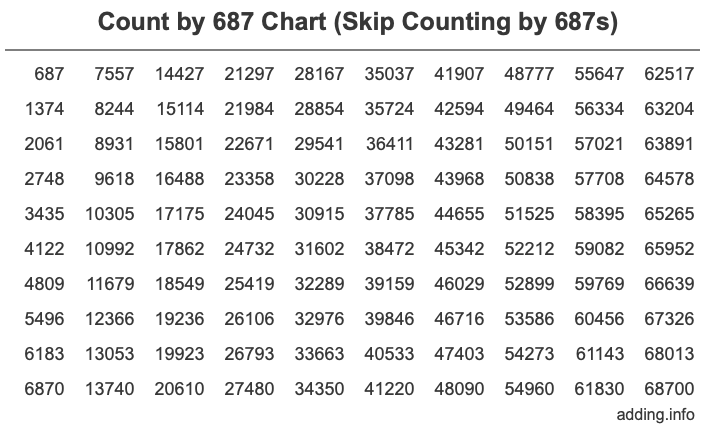Here we will show you how to count by 687, discuss counting by 687 patterns, and tell you why knowing how to count by 687 matters. To start off, note that Count by 687 means counting in 687s, or count by six hundred eighty-sevens, and it is also called skip counting by 687.
How to count by 687
Normally, we would count by 1 like this: 1, 2, 3, 4, etc., but when we count by 687, we count 687, 1374, 2061, 2748, and so on.
In other words, to count in intervals of 687 or skip counting by 687, we start with 687 and then add 687 to get the next number, and then continue adding 687 to the previous number to keep counting by 687, like this:
687
687 + 687 = 1374
1374 + 687 = 2061
2061 + 687 = 2748
2748 + 687 = 3435
...
You can of course skip count by 687 forever, so it is impossible to make a list of all numbers, but below is a Count by 687 Chart of the first 100 numbers to get you started.

Looking at the chart above, you will see that the first column has the first ten numbers you get when you skip count by 687, the second column has the next ten numbers you get when you skip count by 687, and so forth.
Count by 687 Patterns
We organized the Skip Counting by 687s Chart above in 10 rows and 10 columns so you can easily identify patterns.
Skip counting always creates patterns. Figuring out these patterns may help you if want to count by 687, but don't have the Counting by 687s Chart above. Obviously, one pattern with counting by 687s is that the number increases by 687.
Furthermore, if you look at each row above, each number in the row has the same last digit (ones place). That means that every tenth number has the same last digit.
If you look down the columns, you will see that the last digit (ones place) repeats itself in blocks of 10 over and over. The pattern of the last digit when you count by 687 goes 7, 4, 1, 8, 5, 2, 9, 6, 3, 0 and 7, 4, 1, 8, 5, 2, 9, 6, 3, 0 and so on for as long as you count by 687.
Why Count by 687?
We think that understanding and learning about skip counting by 687 is important, because it teaches you how the arithmetic operations fit together. Below are some examples of what we mean.
When you count by six hundred eighty-seven, you are also creating a list of multiples of 687 that you can use in math when you need the least common multiple. 687 times n equals the nth multiple or skip count of 687.
When you skip count by 687, you are also creating a list of numbers that 687 is divisible by. On top of that, skip counting by 687 is the same as making the 687 times table.
Skip Counting
Need to skip count by another number? Enter another number for us to skip count for you.
Count by 688
Here is the next number on our list that we used to skip count.
Copyright | Privacy Policy | Disclaimer | Contact
